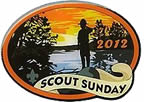 Sometimes the hardest thing to do is to decide to do the right thing.
Sometimes the hardest thing to do is to decide to do the right thing.
Every year we get a handful of Scouts who decide, for one reason or another, not to continue in Scouting. They decide that they’d rather play sports, or are heavily involved in music, robotics or other activities. They think that there isn’t any time left for Scouting.
For many, it takes a stretch of faith to understand the benefits of the Scouting program for our sons. This is especially true in a troop where youth leadership is given lip service, where the adults take a larger-than-necessary role in troop operations and planning, and where troop meetings and campouts seem more like Scout school than a training ground for future leaders at a youth level. Continue reading “Walking away is easy”



 One of the hallmarks of Scouting that sets it apart from other youth activities is its emphasis on youth leadership. Boys form their own patrols and hold elections, govern themselves within the framework of Scouting, decide and plan their own activities, and are generally supposed to be running the show, with adults in the background.
One of the hallmarks of Scouting that sets it apart from other youth activities is its emphasis on youth leadership. Boys form their own patrols and hold elections, govern themselves within the framework of Scouting, decide and plan their own activities, and are generally supposed to be running the show, with adults in the background. The Scouting movement is unique among non-faith-based youth groups in that it recognizes and expects a belief and duty to a higher power of its members. It’s part of rank achievements in Cub Scouts, one of the points of the Boy Scout Law, and the first obligation in the Scout Oath and Venturing Oath.
The Scouting movement is unique among non-faith-based youth groups in that it recognizes and expects a belief and duty to a higher power of its members. It’s part of rank achievements in Cub Scouts, one of the points of the Boy Scout Law, and the first obligation in the Scout Oath and Venturing Oath.